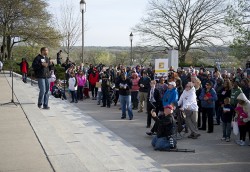The name Trayvon Martin is a household name after people across the country protested the Florida teen’s slaying in March and “Stand Your Ground” laws that prevented his alleged killer, George Zimmerman, from being charged immediately. Drake University Law School students joined the outcry when they organized a rally at the Iowa State Capitol protesting “Stand Your Ground” laws.
“The catalyst that got things going was finding out about House File 2215, Iowa’s very own ‘Stand Your Ground’ legislation,” says Kevin Patrick, a third-year law student at Drake who organized the rally. “This was the straw the broke the camel’s back.”

Patrick was raised in Fremont, Calif.; after earning his undergraduate degree in New Jersey, he moved to Iowa to work on President Obama’s 2008 campaign and ended up staying for law school at Drake. He has been active during his years at Drake, serving as a member of the Drake Law Democrats, the Black Law Student Association and the Asian Pacific Law Student Association.
Other Drake Law students involved in organizing the event were Leslie Behaunek, Amy Gandhi, Dakota McRae, Erin Schneider and Mike Traxinger. Each student was in charge of a different aspect of the event; McRae and Gandhi used their connections from past clerkships at the state house. Behaunek, Schneider and Traxinger worked on publicity and outreach to other groups.
Their work paid off when more than 300 people attended the rally. The crowd listened to Patrick, along with Iowa State Rep. Ako Abdul-Samad, Rep. Beth Wessel-Kroeschell and Jeff Noble, assistant Polk County attorney. The “Stand Your Ground” law in Iowa’s legislature is not expected to pass the Senate, although it did pass in the House of Representatives.
Along with protesting the proposed law, Patrick said the rally was also a call for people to address racism and racial disparities. Some have argued that Martin was shot because he was black. Many Drake students wore hoodies at the rally to signify their support of Martin; he was wearing a hoodie the night he was killed.
“The greatest achievement that could come from the rally is that people will look beyond the superficial, to change how we see each other,” says Patrick. “The hoodie became a symbol of the superficial. It represents our skin color, our religion, our sexual identity—the superficial barriers between us as people. However, if we can get past this, we will be better off as a people and as a nation.”

